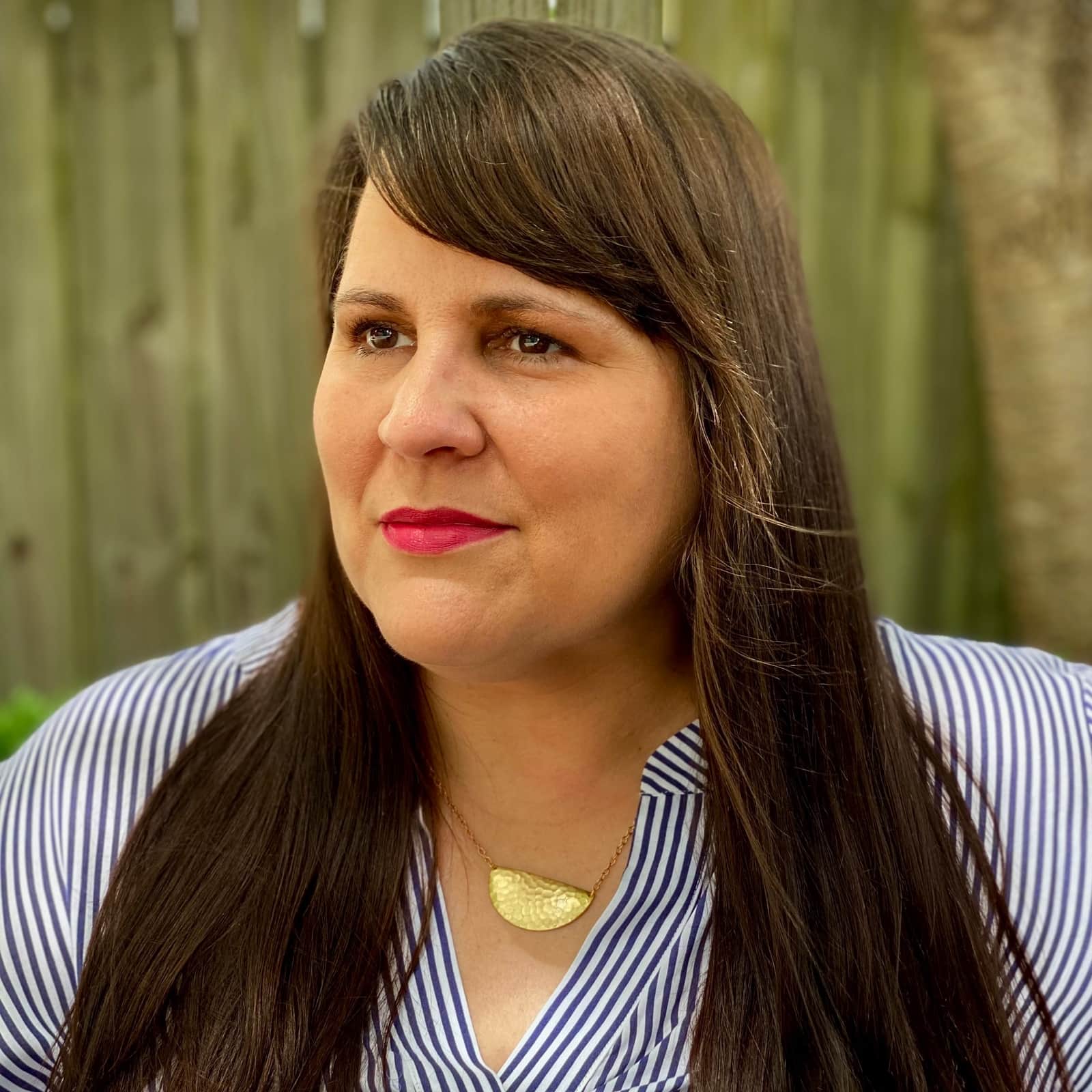Interview with Holly Schroeder

Every week, we meet with audience members with disabilities who are willing to come forward and share a little bit about their own personal journey and experiences, attending live, in-person, or virtual speaking or training events. Through their unique and generous perspectives, speakers, trainers, facilitators, and other communication professionals can hopefully learn about some of the things that they do well, but also (and maybe more importantly) about some of the things they could improve to provide an experience that is truly inclusive of everyone.
Meet Holly, an audience member who is hard of hearing and has multiple other neurological conditions
So without further ado, let’s dive right into this week’s interview with Holly Schroeder (she/her). Holly is hard of hearing, has multiple other neurological conditions, and comes to us from Missouri, USA.
Introductions
QUESTION 01 Can you tell us a bit about yourself, and how your disability might impact your experience, as someone who attends live in-person and virtual events?
Howdy! Let’s just get down to the brass tacks, shall we? I’m a disabled Sr. UX Researcher and writer.
I have a bunch of neurological conditions, I’m hard of hearing, have a central auditory processing disorder, and some mobility issues due to advanced arthritis in both knees from a car accident. My primary neurological quirk is a degenerative brain disease that causes tremors in most of my body (head, face, hands, arms, legs, etc.). I had deep brain stimulation (brain surgery) last year, to help treat the mess. I only had the left brain treated since the worst tremors are on my right side and getting those under control was paramount.
From January ’21 to July ’21 when I had the surgery, I rapidly lost mobility and had difficulty walking. Writing or using a mouse on the computer was difficult. Surgery was a huge success. With my right side stabilized I’m much more confident and the left side tremors, likely due to the reduction in stress improved. I also have had multiple traumatic brain injuries (TBI), hypersomnia (narcolepsy’s less popular sibling), color blindness (tritanomaly), ADD… the list is long.
Things that ruin the experience
QUESTION 02 Thinking back on some of your experiences attending in-person or virtual events, what are some of the worst things speakers, trainers, and other communication experts can do to ruin your experience as an attendee?
I’ve had so many terrible experiences they blur together. The overarching themes are dismissiveness and lack of empathy. Here’s a recap just on live transcripts for virtual events:
- In one instance, I made numerous attempts to get live transcripts enabled during the event and the facilitator rudely dismissed me. I followed up with the organizers after who apologized profusely, promised to educate the facilitator, and swore it would never happen again. Definitely happened the next time I attended.
- Same as above and the organizer asked to meet with me privately to discuss then canceled last minute twice in a row.
- I sent a facilitator a private message as a final attempt to get live transcripts enabled, watched her read it, and then she zoomed off to a breakout room never replying or following up with me.
- An HR person I worked with MANY times forgot to enable transcripts before all-employee events even though I sent her reminders personally asking for them.
Things that make a positive impact
QUESTION 03 Can you share some of the great things speakers, trainers, and other communication experts sometimes do that make a positive impact on your ability to fully enjoy your in-person or virtual event experiences?
When they were unaware or didn’t know how to use live transcripts they apologized for the gap, listened with empathy, and immediately made plans to implement the use of them going forward whether I would be present or not, and DID IT. Asking in advance if anyone has an accommodation request and providing contact info. It’s affirming!
Sharing a piece of advice
QUESTION 04 If you had one piece of advice to give speakers, trainers, and other communication experts, so their content became more inclusive of people who have disabilities, what would it be?
We’re not “out there” we are RIGHT HERE. Plan for us to be present from the beginning instead of trying to cram us in if we show up. At live events have materials available in large font, enable transcripts for presentations live and virtual, have ASL interpreters when possible, make sure the event space is accessible, and anything that a disabled person should know that would help for entry/exit. Describe what is required for entry: 3 stairs with a handrail, two ADA single-user restrooms, disabled parking 100 ft from the entrance via sidewalk on a slight incline. Details matter!
Wrapping up
QUESTION 05 Thank you for sharing some of your insights with us today. As we wrap up our conversation, is there anything that you’d like to add, such as another thought, another piece of advice, another perspective, etc.?
We are better together!
Connect with our guest on social
Interested in knowing more about our guest this week? You can follow Holly on LinkedIn and Twitter. You can also check out the book she co-authored, “97 Things Every UX Practitioner Should Know“, published by O’Reilley.

About Denis Boudreau
Denis Boudreau is a consultant, trainer, and speaker specializing in digital accessibility and disability inclusion. He works with organizational leaders who want to equip their teams with the skills to create accessible websites and digital products – so no one is left behind. A Certified Professional in Web Accessibility (CPWA), Denis has trained thousands of web professionals over the past 20+ years and delivered hundreds of workshops in both English and French. He has helped leading brands like Netflix, Salesforce, and Victoria’s Secret embed accessibility into their digital strategies, empowering them to meet legal obligations, improve user experience, and connect with more people, more effectively.
